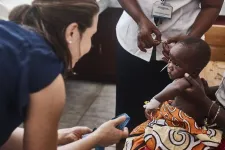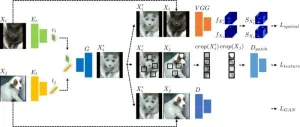(Press-News.org) Drugs to treat common infections in children and babies are no longer effective in large parts of the world, due to high rates of antibiotic resistance.
The University of Sydney led study found many antibiotics recommended by the World Health Organization (WHO) had less than 50 percent effectiveness in treating childhood infections such as pneumonia, sepsis (bloodstream infections) and meningitis. The findings show global guidelines on antibiotic use are outdated and need updates.
The most seriously affected regions are in South-East Asia and the Pacific, including neighbouring Indonesia and the Philippines, where thousands of unnecessary deaths in children resulting from antibiotic resistance occur each year.
The WHO has declared antimicrobial resistance (AMR) is one of the top 10 global public health threats facing humanity. In newborns, an estimated three million cases of sepsis occur globally each year, with up to 570,000 deaths: many of these are due to lack of effective antibiotics to treat resistant bacteria.
The findings, published in Lancet South East Asia, adds to mounting evidence that common bacteria responsible for sepsis and meningitis in children are often resistant to prescribed antibiotics.
The research reveals the urgent need for global antibiotic guidelines to be updated, to reflect the rapidly evolving rates of AMR. The most recent guideline from The World Health Organization was published in 2013.
The study found one antibiotic in particular, ceftriaxone, was likely to be effective in treating only one in three cases of sepsis or meningitis in newborn babies. Ceftriaxone is also widely used in Australia to treat many infections in children, such as pneumonia and urinary tract infections.
Another antibiotic, gentamicin, was found likely to be effective in treating fewer than half of all sepsis and meningitis cases in children.
Gentamicin is commonly prescribed alongside aminopenicillins, which the study showed also has low effectiveness in combating bloodstream infections in babies and children.
Lead author Dr Phoebe Williams from the University’s School of Public Health and Sydney Infectious Diseases Institute is an infectious disease specialist whose research focuses on reducing AMR in high-burden healthcare settings in Southeast Asia.
She also works as a clinician in Australia. Dr Williams says there are increasing cases of multidrug-resistant bacterial infections in children around the world.
AMR is more problematic for children than adults, as new antibiotics are less likely to be trialled on, and made available to, children.
Dr Williams says the study should be a wake-up call for the whole world, including Australia.
"We are not immune to this problem - the burden of anti-microbial resistance is on our doorstep," she said.
“Antibiotic resistance is rising more rapidly than we realise. We urgently need new solutions to stop invasive multidrug-resistant infections and the needless deaths of thousands of children each year.”
The study analysed 6,648 bacterial isolates from 11 countries across 86 publications to review antibiotic susceptibility for common bacteria causing childhood infections.
Dr Wiliams said the best way to tackle antibiotic resistance in childhood infections is to make funding to investigate new antibiotic treatments for children and newborns a priority.
“Antibiotic clinical focus on adults and too often children and newborns are left out. That means we have very limited options and data for new treatments.”
Dr Williams is currently looking into an old antibiotic, fosfomycin, as a temporary lifeline to treat multidrug-resistant urinary tract infections in children in Australia.
She is also working with the WHO’s Paediatric Drug Optimisation Committee to ensure children have access to antibiotics to treat multidrug-resistant infections as soon as possible, to reduce deaths due to AMR among children.
“This study reveals important problems regarding the availability of effective antibiotics to treat serious infections in children,” says senior author Paul Turner, director of the Cambodia Oxford Medical Research Unit at Angkor Hospital for Children, Siem Reap and professor of paediatric microbiology at the University of Oxford, UK.
“It also highlights the ongoing need for high quality laboratory data to monitor the AMR situation, which will facilitate timely changes to be made to treatment guidelines.”
-ENDS-
END
Approximately 80% of Apple's latest iPhone 15 pre-orders in Korea fall within the age group of 20s and 30s. Their keen interest in this expensive device is primarily attributed to tis camera's ability to deliver sharp and particular mood of colors, a hallmark of iPhones. If it can achieve high quality image and video without the need for multiple lenses, it may garner greater support from millennials and generation Z.
A collaborative research team led by Professor Junsuk Rho from the Department of Mechanical Engineering and the ...
□ Daegu Gyeongbuk Institute of Science and Technology (DGIST), led by President Yang Kook, signed credit exchange agreements with two prestigious global universities, National Yang Ming Chiao Tung University (NYCU) in Taiwan and Grenoble INP-UGA in France, on August 15 (Tuesday) and August 23 (Wednesday), 2023, respectively, to expand its global student exchange partnerships. Based on these agreements, DGIST will operate student exchange programs with the two universities, allowing participating students to earn credits by completing regular courses.
□ These agreements were concluded through the ...
□ Daegu Gyeongbuk Institute of Science and Technology (DGIST), led by President Yang Kuk, announced on September 6, 2023 (Wednesday) that the research team of Professor Sang-hyun Park at the Department of Robotics and Mechatronics Engineering had developed a new image translation model that could effectively reduce biases in data. In the process of developing an artificial intelligence (AI) model using images collected from different sources, contrary to the user’s intention, data biases may occur because of various factors. The developed model can remove data biases despite the absence of information on such factors, thereby ...
In a time when bound feet, arranged marriages, and subservience were prevalent, Hui-lan, Ida, and Lucy forged a path that broke free from cultural stereotypes. They skilfully flew airplanes, managed Asia's most opulent estates, and charmed the Western world with their impeccable sense of style and sophistication. Their courage and determination not only shattered stereotypes but also paved the way for countless others to follow in their footsteps.
Daryl Yeap, a celebrated author and historian, invites readers on a captivating journey into the lives of three remarkable women—Hui-lan, Ida, and Lucy—in her upcoming book, As Equals: The Oei ...
USC faculty members Adam Leventhal, PhD and Caryn Lerman, PhD have received a $20 million grant for research to inform government regulations overseeing tobacco and its marketing, with a focus on protecting young people. The USC Tobacco Center of Regulatory Science (TCORS), an interdisciplinary initiative led by the USC Institute for Addiction Science (IAS), USC Norris Comprehensive Cancer Center and the Department of Population and Public Health Sciences at the Keck School of Medicine of USC, is one of seven programs nationwide to receive funding provided jointly by the Food ...
A new study led by researchers at Barrow Neurological Institute has found that people living in regions with median levels of air pollution have a 56 percent greater risk of developing Parkinson’s disease compared to those living in regions with the lowest level of air pollution.
The study, which will be published online on Monday, Oct. 30 in Neurology - the medical journal of the American Academy of Neurology - was conducted to identify national, geographic patterns of Parkinson’s disease and test for nationwide and region-specific associations with fine particulate matter.
“Previous studies ...
Australasia has likely overlooked a pollination crisis, according to new research published today in the journal Ecology and Evolution. The research, led by Macquarie University, also underscores a pressing need for intervention to avoid biodiversity loss and long-term food insecurity in the region.
The authors analysed thousands of research papers on human-induced pollinator decline globally, and found despite only a tiny portion mentioning Australasia, the causes of pollinator decline in the northern hemisphere were mirrored in this region.
Research in Europe and North America finds threats that include ...
New research from a consortium of quantum physicists, led by Trinity College Dublin’s Dr Mark Mitchison, shows that imperfect timekeeping places a fundamental limit to quantum computers and their applications. The team claims that even tiny timing errors add up to place a significant impact on any large-scale algorithm, posing another problem that must eventually be solved if quantum computers are to fulfil the lofty aspirations that society has for them.
It is difficult to imagine modern life without clocks to help organise our daily schedules; with a digital clock in every person’s smartphone or watch, we ...
Multiple studies have shown that the COVID-19 vaccines do not lead to infertility or pregnancy complications such as miscarriage, but many people are still wary of adverse effects from the vaccine on pregnancy.
A new study led by Boston University School of Public Health (BUSPH) researchers now provides deeper insight into the safety of COVID-19 vaccines for people planning to become pregnant.
Published in the journal Human Reproduction, the study found no increased risk of early or late miscarriage as a result of male ...
INDIANAPOLIS, IND – The Canadian Cardiovascular Society (CCS) released the world’s first classification of acute myocardial infarction (AMI), or heart attack, based on heart tissue damage research that was driven by two cardiovascular investigators within the Ischemic Heart Disease Program of Krannert Cardiovascular Research Center (KCVRC) at Indiana University School of Medicine and Northern Ontario School of Medicine.
The four-stage classification, CCS-AMI, was presented at the Vascular 2023 conference on Oct. 29 in Montréal, Canada, and published ...






